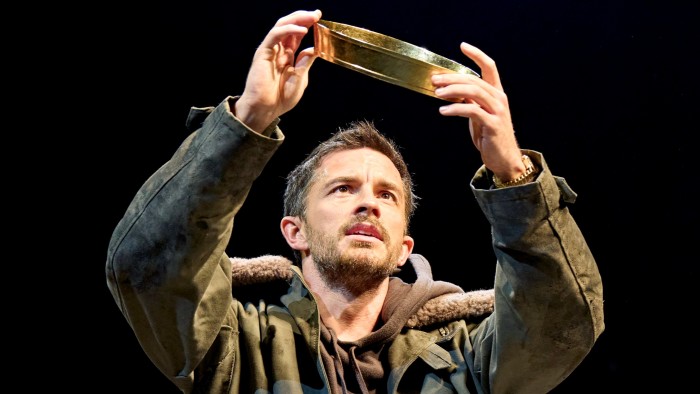Summarize this content to 2000 words in 6 paragraphs in Arabic Unlock the Editor’s Digest for freeRoula Khalaf, Editor of the FT, selects her favourite stories in this weekly newsletter.We first see Jonathan Bailey’s magnetic Richard II picked out by a shaft of white light against a dark platform, sleek in his bespoke suit and velvet loafers. Grant Olding’s music surges through the auditorium, Succession-like in its rippling grandeur, ready to propel Nicholas Hytner’s fresh, fleet staging which styles Shakespeare’s tragedy as a gripping modern account of power absolute and abused.Pinpointed against the dark, Bailey’s Richard looks dwarfed by circumstance — and so it will prove. His king is a man born to rule but unfit for the task, confusing that condition for entitlement rather than responsibility. Privilege has left him brattish, impulsive and brittle — Bailey’s movements are pronounced, chin jutting or limbs sprawling, as if he were performing the authority he hopes to project. At one point he rocks up with the crown in a plastic carrier bag.Hytner’s staging takes the medieval world’s problem — a divinely anointed king who rules badly — and refashions him into our own nightmare: a hyper-rich, arrested child who spins policy on a whim and considers himself beyond the reach of law or hindrance.As news of John of Gaunt’s death is announced, Bailey lounges insolently on the hospital bed recently vacated by the old man, casually making the fatal pronouncement to seize the lands due to Henry Bullingbrook, Gaunt’s banished son. That will prove the final straw for a country staggering under his misrule: the trigger for Henry to return to England and wrestle the crown from Richard’s head.But what Hytner delineates so eloquently is that it’s not Richard who is the greatest problem — it’s power itself, in the shape of the crown. That golden circle tantalises everyone — eternal in shape; temporal in possession — and no one can live up to it. Bailey’s Richard learns this keenly: his famous speech about the hollow crown is sardonic, but flecked with regret, and on surrendering his power he finds a grace and poignancy that had eluded him as king. Throughout there’s a pathos beneath his showboating — he never really knows who he is. It’s a journey deftly traced by Bailey and complemented step-for-step by Royce Pierreson’s wonderful Henry: all watchful stillness, coiled strength and rough pragmatism. Henry will, after deposing Richard, be forever tormented by guilt. Necessary it may be; treason nonetheless.Around these two circle the wannabes and has-beens. Hytner and his cast are often very funny in their depiction of men strutting about or scrabbling for control. Here they’re not courtiers but officials in suits, who bustle about with files of notes or plot together in bars. And beneath the comedy lie cold truths: the huge field-gun that accompanies Henry as he challenges Richard; the swift bullet to the back of the head for conspirators. The company bristles with clear, subtle performances, particularly from Christopher Osikanlu Colquhoun as a shrewd Northumberland and Michael Simkins as York, torn by conflicting loyalties to crown and country.Bob Crowley’s set is a simple black platform thrusting into the audience and composed of panels, through which sets rise to change scenes swiftly. Hytner sends key exits and entrances through the watching crowd. The message is clear: Shakespeare’s drama may deal with characters long gone, but the dilemmas it raises about power are still very much with us.★★★★☆To May 10, bridgetheatre.co.uk
رائح الآن
rewrite this title in Arabic Richard II theatre review: an eloquent staging of Shakespeare’s grand study of power
مال واعمال
مواضيع رائجة
النشرة البريدية
اشترك للحصول على اخر الأخبار لحظة بلحظة الى بريدك الإلكتروني.
© 2026 جلوب تايم لاين. جميع الحقوق محفوظة.









